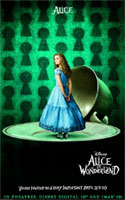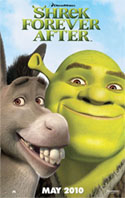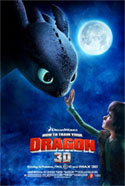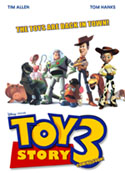ALICE IN WONDERLAND: I found Burton’s decision to film a sequel while advertising it entirely as an adaptation to be brilliant, disorienting, and surreal — much like the film itself. It also gave Burton the freedom to make Tim Burton’s Alice in Wonderland, which, ultimately, is what I wanted to see. The Alice in Wonderland story has achieved the status of modern myth, in my opinion, and that makes it fair game for creators looking to express their own vision through its form.
SHREK FOREVER AFTER: I found the original Shrek to be a merely passable film with a charm that was largely negated by its creators scrawling “I HATE DISNEY” over it in large, crude letters. On the other hand, Shrek 2 capitalized on the strengths of the original, resulting in a film that was superior to it in every way and exceedingly enjoyable in its own right. On the third hand, Shrek 3 was so incredibly bad that I literally can’t remember anything about it. And on the increasingly improbable fourth hand, I enjoyed Shrek 4 quite a bit. It was a well made and funny film. Not as good as Shrek 2, but as good as Shrek would have been if it wasn’t for Dreamworks settling personal grudges.
HOW TO TRAIN YOUR DRAGON: On the other hand, this is the movie that makes it clear that Dreamworks Animation is on the right track. It’s tight and it’s fun. You know how awesome you always thought dragonriding would be? How to Train Your Dragon shows it to you.
TOY STORY 3: Pixar once again proves that they are masters of subtle, powerful, profound, and joyous storytelling. I think you could make a very strong case that this is now the best trilogy of films ever made.
(The question now isn’t, “Will there be a fourth?” The record-breaking box office assures us that there will be. The question is, “Can they find a new story to tell?” It seems to me that the films have exhausted the potential experiences of a toy, but I’m willing to be pleasantly surprised.)
















ARCHIVED HALOSCAN COMMENTS
Dave Cesarano
I found Alice to have been a train-wreck of a film, at best. Tim Burton can only make one single kind of movie–a story about misfits. Sometimes, this works, like with his first Batman flick, or Sweeny Todd. Other times, his fetishization of misfitism cripples his work, overwhelming it and hijacking the entire narrative (Batman Returns, for example).
Carol’s work was allegorical, and meant to be weird, but not about misfitism. But when Burton got his grimy paws on it, boy howdy. End of the line.
The entire plot was paint-by-numbers formulaic and utterly predictable. “Cue Alice’s self-doubt. Okay cue inspiring speech by white queen.” In addition, the Red Queen’s behavior is completely ridiculous. “Oh, the Vorpal Sword has been stolen by Alice? She’s destined to kill the Jabberwocky with it? Oh, well, let’s ready the Jabberwocky for battle, then!” What? In her shoes, I’d have sent the Jabberwocky as far away as possible until the prophecied day was over or Alice no longer held the sword.
The plotting was just incredibly weak and the characterizations were dull and uninteresting. In every instance, the plotting took the path of least resistence. I just didn’t think it was very good at all.
Sunday, July 04, 2010, 6:18:06 PM
Thomas W.
They were about to have a war, troops vs troops. It wouldn’t have made much sense to send the jabberwocky away. Their troops weren’t fighting very hard, and any victory would have been slow, painful, and not decisive. Control of the jabberwocky allowed the red queen to sweep the enemy troop and rip them to shreds. Without the Jabberwocky, the red troops would have likely disbanded as well, due to the white queen’s charisma.
Presumably, she believed that by acquiring the scroll which revealed the future, she could change the future, and was arrogant enough to believe she’d done enough.
I liked it. It was sorta like Avatar. Weak, predictable plot, as you said- but extremely well done filming, beautiful world, lots of strange and curious occurances. The mad hatter, what with him being the best actor in the film, was decent, as was the white queen. The fact that the protagonist was rather boring, as revealed by every trailer which focused on the mad hatter, didn’t take too much from the story.
Monday, July 05, 2010, 8:14:38 AM
Dave Cesarano
You’re justifying the Red Queen’s decisions using logic never expressed in the film. In addition, the Jabberwocky never actually took part in the battle itself–it just fought Alice and (predictably) was killed. I understand what you’re saying, but it still doesn’t cover up that massive logic-gap.
I can’t fault you for liking eye-candy. Yeah, the movie was beautiful, but it was all style and no substance, to me. I’m no longer as impressed by computer-generated effects anymore. That they are becoming a substitute for story and characterization disturbs me.
Monday, July 05, 2010, 7:41:55 PM
Thomas W.
It’s repeatedly said she’s arrogant. And the white queen says prophesies aren’t certain, it depends on Alice’s willpower, on whether she is truly Alice. So the film did explain a lot about how prophesies aren’t certain.
Looking at the battle scene, and remembering the queen, it’s clear she didn’t do much to actually try to stop Alice. She should have. But Alice is utterly uncertain of herself, afraid, and doesn’t scare the queen early in the fight. And as such, the Jabberwocky almost kills Alice, till the Hatter intervenes. The destiny wasn’t so strong that logically, the red queen would have thought she couldn’t win, as the film shows us.
Still, I get what you’re talking about. They do sorta explain it, but not very well. The film is too positive. To really show that the queen was serious about stopping Alice, she should have killed off some of her friends to demoralize her and show that the heroes don’t always win. Even more than the prophesy, the film is so positive you never really have any fear that the heroes are going to win, and win without any awkward sacrifices.
Just by being there, it was taking part. “No doubt. But without the
Jabberwocky to keep the rabble
in line, they would surely rise
against me.”
And after it died, they stopped fighting. Predictably. She needed it for the battle.
With the battle strategy, they said they were preparing it for battle. It obviously could attack people other than Alice. And since all the battles we saw were of characters defeating lots of red soldiers, it was necessary. Another sign of how very positive the film is.
Hey, it had substance. It had a strongly executed, if utterly bland and predictable as you said, plot, that was substantial and detailed. It never lost track of where it was going, and the continual beauty of the world and the two good characters made that ride especially fun. The other bad characters kinda dragged it.
Creativity and unusual storylines are a bonus, but I can enjoy predictable plots too. So long as something is happening. My earlier example, Avatar, failed in that regard. It always had style, but the substance dropped about half way through when Jake decided to spend an hour or two learning how to fly pterodactyls and getting in touch with his inner self. That is no substance, and was rather boring, if pretty.
Wednesday, July 07, 2010, 10:02:23 PM
Andy P
I am surprised you can be so glowing about the “profound and subtle” about the Toy Story series. Since the entire first film, for example, was based around the premise that “you can only be happy when subjugating yourself entirely to your owner”, the subtle and profound message was “know your place and stay there”. That is not the kind of thing we should be saying to our collective youth – I felt physically sick watching Toy Story, it was a revolting and odious attempt at brainwashing. Possibly borderline evil.
Compare to, for example, Antz, a film of a similar ilk, but in which the entire premise is that “no matter how hopeless things may seem, even one small person can make a positive difference”. A much more enriching subtext, and a much better movie as a result.
Sunday, July 04, 2010, 1:09:43 PM
Justin Alexander
That’s an interesting interpretation of the movies. But nothing in the movies seems to frame the relationship between kids and their toys in terms of “master-slave”. The frame of the movies is “love”. And sometimes that love is dysfunctional and sometimes that love is one-sided and sometimes that love is abusive, but that love can also be holistic and healthy. So I wouldn’t describe the message of the films as “know your place”, but rather “fight for what you want and for the people you love”.
I would particularly look at Sid in the original movie as a refutation of your interpretation of the toy-kid relationship in these movies. Even if we decide that Woody and Buzz haven’t legally become Sid’s property, there’s no question that the relationship between Sid and his own toys cannot be categorized as “those toys should just be happy being subjugated by Sid”.
Monday, July 05, 2010, 12:51:16 PM
Liked by Guest
Malimar
If they had advertised Alice in Wonderland as a sequel, they might have had to admit (or, more precisely, had nerds complaining – there doesn’t seem to be much actual relationship between the two other than the premise) that they were just making an unauthorized American McGee’s Alice movie.
Saturday, July 03, 2010, 9:58:16 PM